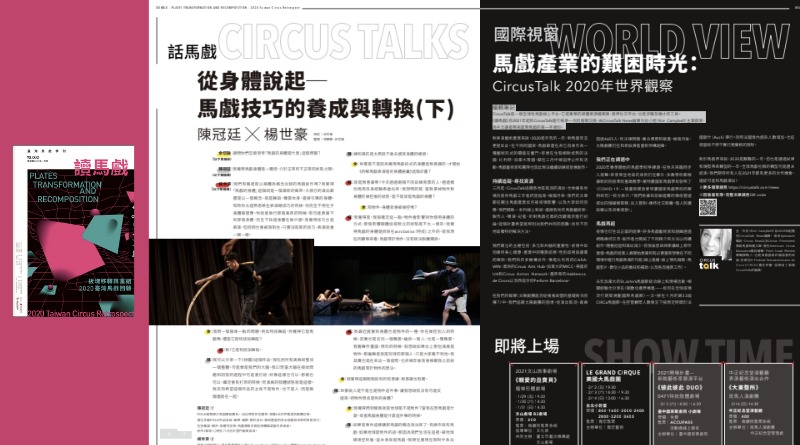DU MA XI Collaboration: The Hard Times in Circus–A World Overview from CircusTalk 2020


DU MA XI is the first circus media in Taiwan, founded in 2020 as a quarterly magazine whose mission it is to connect Taiwanese circus to the world by presenting Taiwan’s ongoing circus events such as productions, festivals, shows, and the ongoing cultural evolution there in the circus arts. DU MA XI plans to bring in-depth reports on the issues around circus in Taiwan. Based on feedback from our member survey suggesting we include more circus news from Asia, CircusTalk has partnered with DU MA XI to share their circus news quarterly through articles written by FOCA Formosa‘s Tai-Jung Yu. As editor of DU MA XI, Yu has recently published this article overview of 2020 in circus worldwide that we wrote to give DU MA XI readers in Taiwan some context about circus around the globe. We repost it here in English. Meanwhile, stay tuned to get your update about Asian circus from Yu on CircusTalk in February, 2021.
The Hard Times in Circus–A World Overview from CircusTalk 2020
2020 has been a tough year for performing arts, and particularly for circus, an art form that is still in the process of convincing its own individual governments and institutions in various nations to consider it worthy of investment in the form of a national school, touring grants and governmental arts support. Even countries that have seen the value of an extensive international touring network which brings tourist capital to them (France, Belgium and Canada come to mind) essentially were forced to shut down for the year by mid-March, closing their professional and recreational circus schools, their residency spaces, their circus venues and to halting all tours.As a result, circus artists and companies everywhere were unable to train in their disciplines or to develop or perform their shows. The sector built around the support of the art form ground to a halt, stopping all revenue sources with it.
Keeping Track and Finding Resources
CircusTalk responded to the international lockdown with the same shock and concern as the circus sector. We began in March by keeping track of cancelations around the world for a quick reference, adding an international country by country resource guide for unemployed circus artists and creators. For months, it seemed like all of our articles revolved around the impact coronavirus was having on the circus sector, and how each region was responding. We introduced a COVID- Relief discount to our PRO membership level and made many PRO features temporarily accessible for the entire community while increasing the offerings in our free zone.
In March we launched a panel series that addressed the changing needs of the international circus community. The first panel was titled Urgent Concerns–Circus Community Responds to COVID-19 and included eight artists, producers, directors and journalists from around the globe-each expressing their unique issues and solutions. CircusTalk has continued to offer these panels regularly (now titledCircus and Changing Realities 2020), and we continue conversing with circus professionals around the globe, identifying the common struggles and unique solutions in various world regions as we attempt to adapt to pandemic closures which challenge the survival of the industry.
We focus on relevant issues; the importance of diversity and inclusion, maintaining mental and physical health during a pandemic, and instances of racism, sexism and abuse in the industry. Our latest series, Wake Up Call for Inclusion has timely panels such titled Institutional Barriers and Individual Biases in the Performing Arts for Women of Color. CircusTalk explored each sector of circus, including schools,companies, and organizations. While curating these industry-wide discussions we partnered with organizations such as CARAVAN (Belgium), Circus Arts Hub (Australia), MICC (Canada), IJA (USA), Hablemos de Circo (Mexico), Circus Action Network (USA) and Perform Health Barcelona (Spain.)
In our article Can Cirque du Soleil Bounce Back on Shaky Ground?, we followed the progression of Cirque du Soleil’s struggle for survival, from show closings to layoffs (over 4600 employees), to their legal troubles, compounding debt and bankruptcy. Months later and Cirque du Soleil is still restructuring along with their new investors while the circus artists of the world remain largely unemployed in their field until the return of live, in-person shows resume.
We’re Adapting
The professional circus school closures that were prevalent in the spring of 2020 were phased out in the fall. Most circus schools resumed with news protocols even as coronavirus cases rose in some regions. Industry standards have emerged for social distancing while training that address the high contagion points in training.The National Circus School in Montreal released their plan and strategies on CircusTalk in a report titled COVID-19: Reopening the National Circus School in Montreal – A Case-Study. They explain, “The evidence thus far pointed us to four mitigation strategies for reopening: entry and exit control system, social distancing, personal protective equipment and disinfection.” The document then outlines in great detail how to achieve those strategies.
Re-emerging Circus
One positive outcome emerging during the pandemic is that resilient artists and organizations feel the need to continue connecting through their networks. Creators also found ways to continue to create using different mediums and disciplines. With less touring and shows happening, introspection and exploration have led to the proliferation of new artwork available online.
While together through online panels and conferences, people in the circus industry began to recognize the need to reimagine possibilities for circus in a different setting (online live, online pre-recorded, circus films, commissions and grants for short digital works, and in-person distanced works.) The St. John’s International Circus Festival in Canada made a hybrid experience this year, combining online and in-person events, which they wrote about in the article Pushed to the Digital Edge– How to Plan an International Circus Festival During a Global Pandemic! In October, article 33rd edition of the CIRCa Festival went on as planned in Auch, France with audience size restrictions and fewer showsl during a week when increases in the COVID-19 virus was forcing much of France to instill more severe restrictions.
Online gatherings have led to productive conversations about how the pandemic itself has revealed frailties in the infrastructure of our sector, indicating structural changes that could make circus a more resilient industry. One such conversation was captured in or panel talk titled Imagining New Infrastructure for Circus.
2020 has been a hard year for circus but also a year that will transform it by trial and circumstances. Our transformation as a worldwide circus community may not be over yet, but for 2021, let’s hope for even more collaboration, connection and more circus shows for all!
To read the entire issue of Du Ma Xi’s Vol. 002 Plates, Transformation and Recomposition, a 2020 Taiwan Circus Retrospect, visit here.
Editor's Note: At StageLync, an international platform for the performing arts, we celebrate the diversity of our writers' backgrounds. We recognize and support their choice to use either American or British English in their articles, respecting their individual preferences and origins. This policy allows us to embrace a wide range of linguistic expressions, enriching our content and reflecting the global nature of our community.
🎧 Join us on the StageLync Podcast for inspiring stories from the world of performing arts! Tune in to hear from the creative minds who bring magic to life, both onstage and behind the scenes. 🎙️ 👉 Listen now!